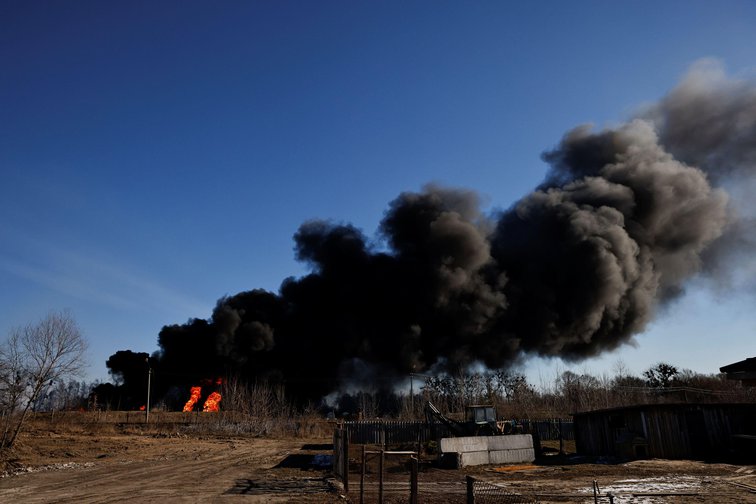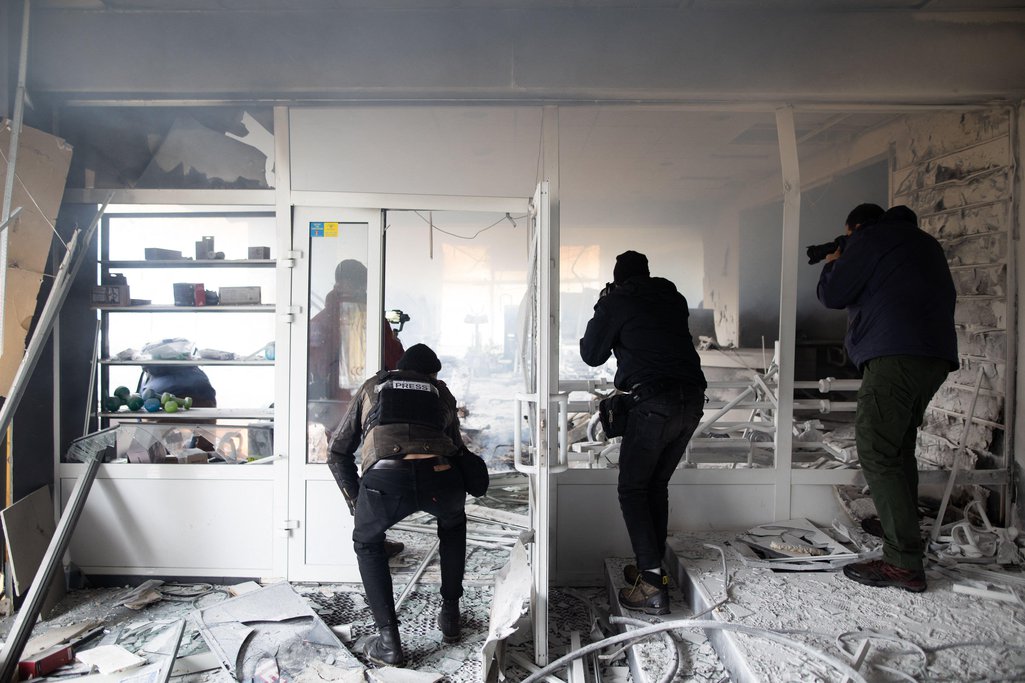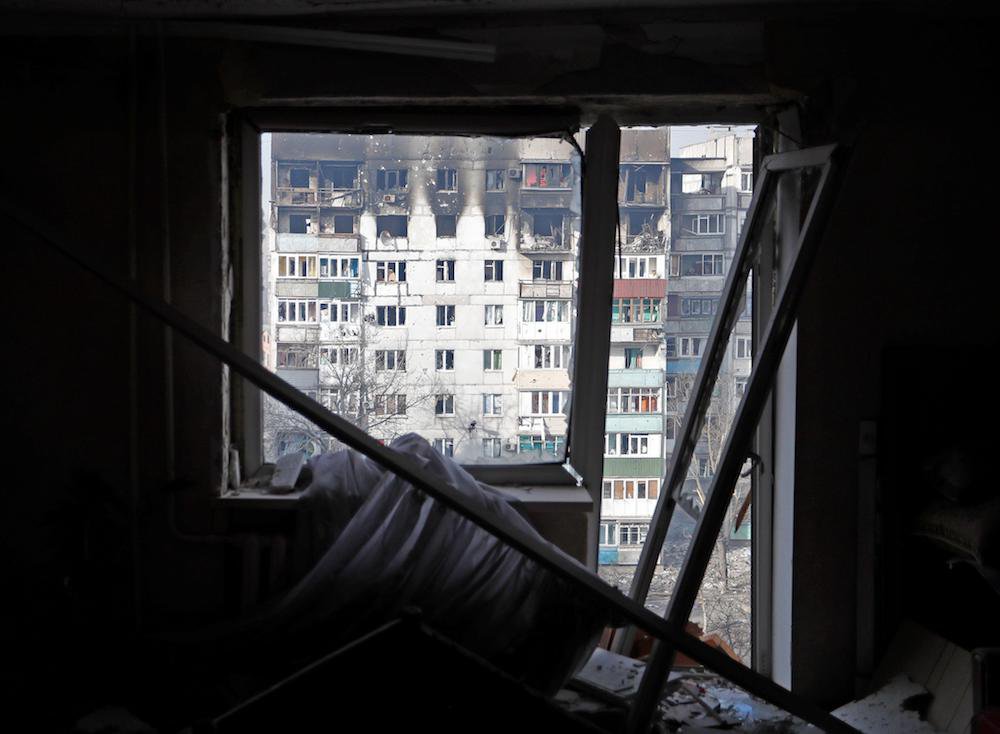International media are abusing the heroism of Ukraine’s journalists
As international media try to cover the horror of Russia's attack on Ukraine, they are failing the people who are helping them do it: Ukrainian journalists and producers

Aweek before Russia started its full-scale invasion of Ukraine, I was working as a local producer for a British TV channel.
Sitting in a nice restaurant in Mariupol, my colleagues and I discussed potential scenarios for how the invasion would play out. In general, the conversation boiled down to the phrase “it could be a shitshow of a battle” and the fact that today, even the most experienced military correspondents have never dealt with a confrontation between conventional, well-equipped armies.
The war that is now ravaging Ukrainian cities is a new challenge for everyone who works in the media. Experience of previous conflicts is almost irrelevant. After 24 February, the security expert we were working with returned home to Ireland for a few days: he realised that all his security protocols for journalists needed to be revised. None of his previous work – Iraq, Syria, Libya, Sudan – was adequate to guide journalists on how to act in the midst of two European armies fighting a ground and air war.
That said, working as a foreign journalist is relatively easy in Ukraine. Many people speak European languages. You can get to Kyiv from, say, Belgium in one to two days by plane or train – you don’t have to smuggle yourself in like the war reporter Marie Colvin in Syria. In my view, there is a clear division between the good guys and the bad guys in this war – and there is no need to delve into the political context. The fact that we are living through such a large-scale war in Europe will definitely help you sell any article or other work. To make a successful story, it’s enough to go out on the streets of Kharkiv and talk to the first person you meet.
This is why Russia’s war against Ukraine has attracted everyone – journalists from major international media, freelance writers and photographers, documentary filmmakers of all kinds. Most of these people are united by one factor: they can do almost nothing on their own.
It is hard to find and finish a story if you don’t know the language and can’t even ask questions. Foreign journalists need good local producers to provide language skills, cultural and regional understanding and contacts on the ground. The resourceful and well-informed locals who assist foreign journalists are often called ‘fixers’, which I think is a demeaning and stupid term.
For Ukrainian producers, working for a big, international media organisation is a good way to ensure at least some security and financial stability. In an ideal world, Western journalists and their local colleagues would support and respect one another.

March 2022: Journalists cover a Russian attack on Kyiv
But in practice, it’s almost the opposite. A month into this war, we can see that Western journalists – although not all of them, and not on every occasion – regularly show disrespect to their Ukrainian colleagues. They neglect Ukrainian colleagues’ safety. They violate all possible ethical standards, which, 20 or 30 years later, they will go on to teach young journalism students somewhere in Missouri or London.
“You are lucky that we had a spare bulletproof vest,” journalists for a major Italian TV channel told one of my acquaintances, a local producer. “It’s your problem that you don’t have one. We’re going to Kharkiv.” These journalists dismissed the idea that they might need to provide a protection kit for the driver. My colleague refused to work for them under these conditions.
Some Western journalists seem to have a sense of entitlement based on the idea that they do better work than their Ukrainian counterparts
Journalists from a major American television channel asked another set of Ukrainian journalists: “Why don’t you want to go to Mariupol with a humanitarian convoy? It’s so important to show what’s going on there.”
These American journalists don’t understand that the producer and the driver – because they have Ukrainian passports – won’t be let through Russian checkpoints, but instead will be stopped and interrogated by FSB agents.
They don’t understand that having a journalist travelling with a Ukrainian humanitarian convoy is seen as increasing the risk that it will be targeted by Russian forces.
Often they want to record a ‘standup’, where a TV journalist appears in front of the camera to narrate a story against the background of a ruined city. They say they want to do this because it’s “important”, but this isn’t the full story. The real reason they want to do a standup in the midst of active fighting, which represents an unnecessary risk for a whole team of journalists, is that it increases the likelihood that this particular reporter will receive an award or an improved contract at home – for having displayed ‘courage’ and a sense of ‘sacrifice’, or some other empty words.
Some Western journalists seem to have a sense of entitlement based on the idea that they do better work than their Ukrainian counterparts. And yet, following the Russian invasion, it was Ukrainian journalists Yevhen Maloletka and Mstislav Chernov who managed to cover something no one else could: they were the only journalists actively working in Mariupol as the city underwent a siege by Russian forces. They managed to document the shelling of the Mariupol maternity hospital for the Associated Press and, thanks to them, the whole world saw what was happening there. When one sees the work Maloletka and Chernov have done in Mariupol, all attempts to reach this besieged city under continuous shelling to film what amounts to war porn seem futile and mainly based on journalists’ desire to show off.

27 March, Mariupol
The death of Ukrainian producer Oleksandra Kuvshynova and Irish Fox News cameraman Pierre Zakrzewski in a Russian shelling attack on 14 March on the outskirts of Kyiv is a case in point. One has to wonder why the Fox News team saw fit to travel to such a dangerous location for their interviews and report. One of my colleagues, a fellow producer, saw the footage that the team shot after it was retrieved from a camera that hadn’t sustained any damage and was of the opinion, which I share, that it could have easily been filmed in the centre of Kyiv. In this sense, Fox has blood on its hands for Kuvshynova’s death. The only difference, had the Fox team filmed in Kyiv, would have been the absence of automatic gunfire in the background. But there is a pressure on journalists, particularly TV journalists, to be as close as possible to where the action is in order to make strong images, which will contribute to high TV ratings (and earn the journalists some praise).
I was not shocked to learn that many major media outlets have a long history of letting local experts down. Some foreign journalists are notorious because several of their local producers have died while working for them.
But I was shocked by the cynicism with which international media outlets exploit Ukrainian producers and experts.
Russia’s war has already been going on for more than a month, and international editors seem to worry that their audience’s interest in the conflict might fade
Fox News’ reaction to the death of Oleksandra Kuvshynova was arresting. First, the network delayed the announcement of her death, which they later claimed was done so that they could inform her family. Then Fox named her as a “consultant”, rather than a journalist and they kept referring to her by her nickname, Sasha, which felt disrespectful. It was as if it was not their colleague who had died, but simply an acquaintance from Kyiv. Local producers generally don’t receive recognition for their essential contribution to reporting. Kuvshynova’s case has made it clear that this lack of recognition continues when they die.
The behaviour of many international colleagues (who work for Western as well as Middle-Eastern or Asian media outlets) regarding security is simply unprofessional and irresponsible. These are some of the main problems:
- Some journalists don’t look for bulletproof vests, helmets and first aid kits until they arrive in Ukraine, as though they have little idea where they were going
- They do not listen to the warnings of local producers about the level of danger, even though these producers are the ones who know the local geography and communicate with the Ukrainian military and volunteers
- They do not pay the agreed fees, or they haggle, as if bargaining for tomatoes at the market
- They demand local producers go into dangerous situations without any real goal
- They do not understand that they have a choice about being in a war zone. Ukrainian journalists do not have this choice
- And, most importantly, they do not understand the obvious fact that they are safer everywhere because of their foreign passports, long-term contracts and insurance
There is little that Ukrainians can do to prevent Western journalists and the outlets they work for from making these mistakes. So I encourage their colleagues in the international media community to speak up, and call out these unacceptable behaviours.
Of course, the relationship between foreign journalists and local fixers relies on a power imbalance. When an experienced producer says he won’t travel somewhere dangerous, it’s always possible to hire a local English teacher who will go anywhere for half the money, or a young journalism student. For many, journalism is still a macho quest for glory and heroism, and Ernest Hemingway’s dispatches from the Spanish Civil War remain a role model to this day. And just like the characters in the movies they watched, this newly-employed teacher or student will go into hell itself without a bulletproof vest. Our colleagues who want to play it hardcore just say: “Everything will be OK, don’t bottle it”.
Guidelines for reporting in dangerous situations, including conflict zones, have existed for a long time. Some media outlets adhere to them and really care about the wellbeing of their employees, whether it’s a journalist from London or a local producer from Dnipro. When a security expert takes off his bulletproof vest and gives it to their Ukrainian driver simply because he understands that the lack of an additional bulletproof vest is his responsibility and that the driver should not be exposed to additional danger because of it, that’s a start.
But we have to demand that every international media outlet adheres to these principles. Otherwise, the death toll for journalists in Ukraine will increase every week. Russia’s war has already been going on for more than a month, and international editors seem to worry that their audience’s interest in the conflict might fade. The west Ukrainian city of Lviv, which is far from the frontlines and where a lot of journalists are based, is no longer enough for them. They want blood, death and shooting. And they’re probably going to get it.

%20(2)%20(2)%20(1).png)
No comments:
Post a Comment
Note: only a member of this blog may post a comment.